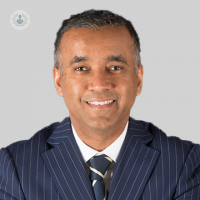What should I avoid doing after my facelift?
Escrito por:Top Doctors had the pleasure of catching up with incredibly well-regarded plastic, reconstructive, and aesthetic surgeon, Mr Fateh Ahmad, who provides us here with an in-depth insight into how a typical facelift procedure is performed, what the potential associated risks are, and what patients should avoid doing after their facelift operation.

How is a typical facelift performed?
Depending on the type of facelift performed, the operation can be performed either under local anaesthetic or a general anaesthetic, and either as a day-case procedure, or with a planned overnight stay.
What are the different types of facelift surgery?
A hitch lift is a common type of facelift operation. It is a minimally invasive, minimal-scar procedure ideal for younger patients that require additional volume along the cheekbones only. This can be done under local anaesthetic, and as a day-case procedure.
SMAS tightening-type facelifts are also quite common. These are performed under general anaesthetic, with the main aim being to address the cheek and jaw areas.
What are the main potential risks?
There are, unfortunately, a handful of risks associated with facelifts. The main ones include the following:
- hair loss
- pigmentation changes
- facial nerve damage
- stitches
- loss of skin
- infection
- scarring
- bleeding
- swelling
- bruising
- alteration in sensation
What does recovery involve?
Patients who have undergone a facelift procedure are typically able to return to their normal daily activities two weeks after their operation.
What can I do at home to help my scarring heal quickly?
After roughly six weeks, patients are encouraged to gently massage their scar in a circular motion.
What should patients avoid doing after a facelift?
Patients should avoid returning to work for the first two to three weeks following their facelift. Patients should try, at all costs, to not let their wounds get wet for the first week, and, so, are encouraged to have baths instead of showers.
It is also highly recommended that patients do not sunbathe for the first two weeks, and avoid flying on a plane for the first six weeks after their life-changing operation.
Consult with Mr Fateh Ahmad today if you are considering undergoing a facelift. Visit his Top Doctors profile to schedule an appointment.


